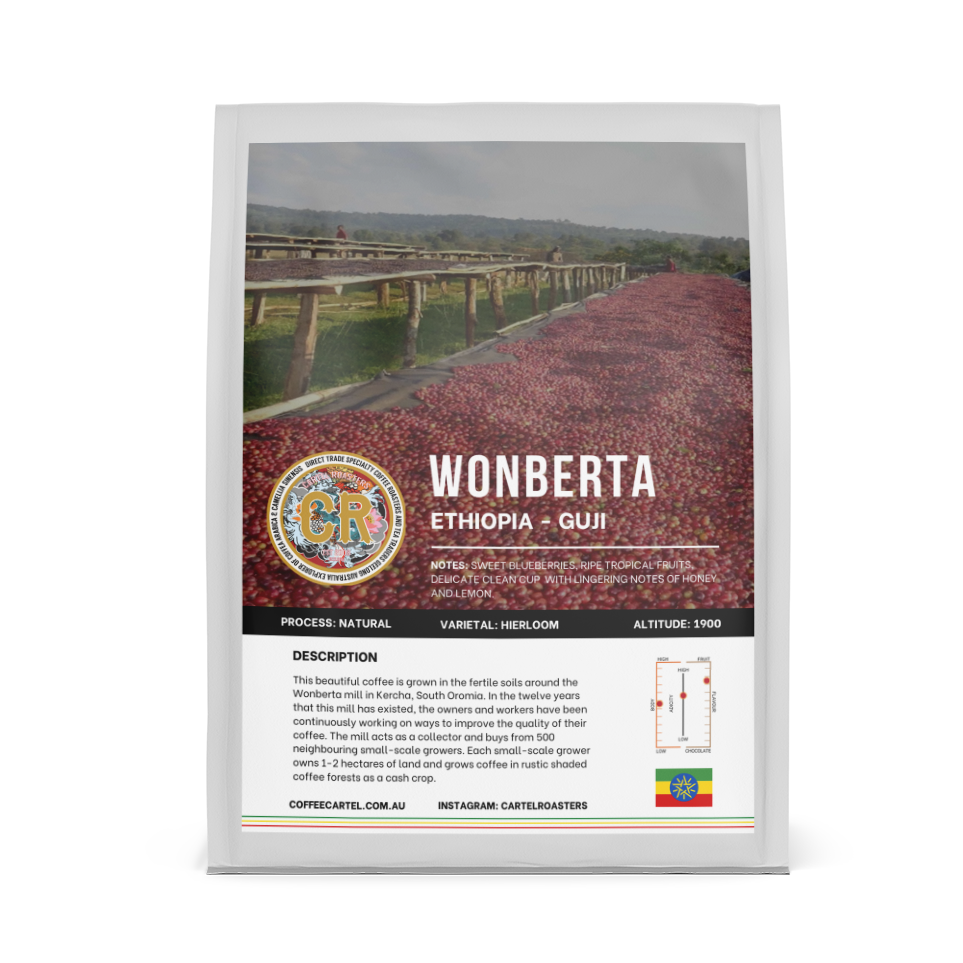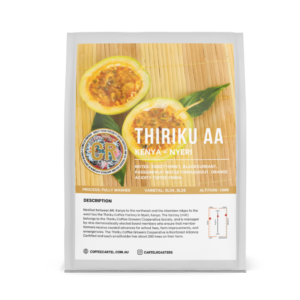About this coffee
- Altitude: 1800 MASL
- Farmer: VARIOUS SMALL HOLDERS
- Score: 87
- COUNTRY: ETHIOPIA
TASTING NOTES: CLEAN SWEET, BLUEBERRY, HONEY & TROPICAL FRUIT
About Ethiopia Wonberta Sidamo Natural
Sidamo is a province in the southern part of Ethiopia, with its capital city at Irgalem, and after 1978 at Awasa. Through our friends at Trabocca we source our Sidamo coffees from a number of direct relationship cooperatives and farmer groups; almost all of these coffees are grown at between 1800-2200mtrs above sea level and most of the cooperatives produce both washed and unwashed coffees. All coffees in Sidamo are harvested between October and January with the main shipping period commencing in April through to about September each year.
This beautiful coffee is grown in the fertile soils around the Wonberta mill in Kercha, South Oromia. In the eleven years that this mill has existed, the owners and workers have been continuously working on ways to improve the quality of their coffee. The mill acts as a collector and buys from 500 neighboring small-scale growers. Each small-scale grower owns 1-2 hectares of land and grows coffee in rustic shaded coffee forests as a cash crop.
The washing station has about 18 fermentation tanks and fresh water from the near by mountain streams for processing washed lots. This coffee is a natural process, meaning that the coffee is not pulped and is sun-dried with the pulp on. In Natural processing, only fully ripe cherries are handpicked and only fresh ripe-red and purple are sun-dried on African drying beds without any pulping or washing. Once the coffee has reached the optimum moisture level, the coffee is then rested. The coffee is then milled, graded, picked by hand and bagged up, ready for export.
Guji Coffee
The Oromo people of Guji consider their region as the ancestral cradle of Oromo culture. The ceremonies, rituals, and lore that come forth of the Gada age-group system, are still subsequently and widely practiced among Guji’s inhabitants. Besides the system, coffee farming has ancient roots within the Guji culture – the two are inseparable.Coffee professionals throughout the world are realizing that Guji, as a coffee region, is significantly different than its neighboring regions, Sidamo and Yirgacheffe. Guji zone was previously categorized as a sub-region of Sidamo, but has proven itself as distinct. It has gained reputation and stature because of its unique and differentiating flavor
SOME HISTORY ON ETHIOPIA
Ethiopia earned 866 million USD exporting 221,000 tons of coffee during its last financial year .
According to Ethiopian Coffee & Tea Development and Marketing Authority, it has accomplished 92 per cent of its set goal to increase coffee exports. ” It is a very great achievement compared to nation’s previous years’ coffee export performance .”
Comparing to the coffee export volumes of 2015/16, there had been 11.5 Per cent growth in the coffee exports during the just concluded fiscal year 2016-17. Plus ,the foreign earning from coffee has raised by 20 percent due to the global coffee price hikes .
In a recent exclusive interview with The Ethiopian Herald, Market Development and Promotion Directorate Director Dassa Daniso said: ” Ethiopian Coffee has been imported to over 60 countries. But, this year, 57 countries have imported our coffee, particularly, 86 per cent ofthe total coffee exports destined for Germany, Saudi Arabia, Japan, USA, Belgium, Sudan, South Korea, among others.”
Coffee all started in Ethiopia in the 9th Century when the goat-herder Kaldi, noticed his goats acting more spritely after consuming cherries from a certain plant. Kaldi tried the cherries and noticed some of the familiar effects that we all feel when we enjoy some of the good drink in the morning. While this is a popular account of the ‘Discovery’ of coffee, there are other accounts of traders chewing cherries on trade routes from Ethiopia in order to increase energy. Ethiopia’s history is full of dramatic changes. Over the last four decades, the Ethiopian people have lived under three different forms of government, which include a semi-feudal imperial, a military rule with Marxist ideological orientation from 1974-1991, and a federal governance system from 1991 until the present. All of these periods have been accompanied by dissatisfaction, armed resistance and rebellions. Ethiopia has also confronted economic, social and environmental problems including a war with Eritrea from 1998-2000. This recent dispute with Eritrea as well other historical conflicts has provoked many damages, including lost lives, limited access to the land, emotional trauma, and extreme hunger.
Coffee still grows wild in Ethiopia’s mountain forests. Ethiopian farmers cultivate coffee in four different systems, which include forest coffee, semi-forest coffee, garden coffee and plantation coffee. About 98% of the coffee in Ethiopia is produced by peasants on small farms and it is the country’s most important export. Ethiopia is Africa’s third largest coffee producer. There are about 700,000 coffee smallholders in Ethiopia, of which 54 percent are in semi forest areas. Coffee has been part of their indigenous cultural traditions for more than 10 generations.





